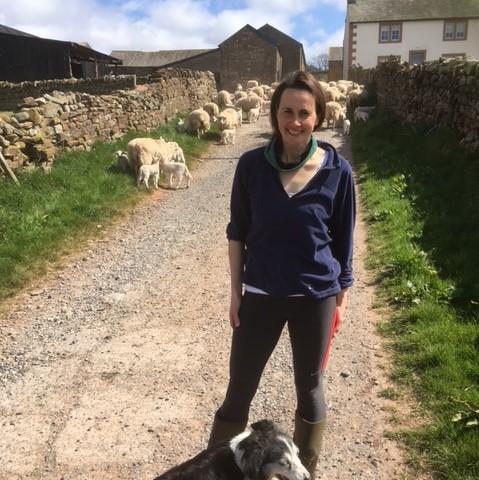Beavers don't eat fish
15th June 2017 by OFC

Nicola Renison farms 350 acres with her husband Paul on the edge of the Pennines. They have 1000 Aberfield x ewes, a small suckler herd and rear dairy heifers on contract. As a new entrant and a new farmer, she approaches the business of farming with an open mind and zero tradition, and is one of AHDB’s progressive sheep group.
On a recent visit from farming friends we were talking about beavers and flooding. One of them said “but beavers eat fish”. Actually, beavers don’t eat fish. And it struck me how representative this is of ingrained attitudes we often find in farming. It is sometimes easier not to think too hard about what is going on around us, but actually, as big changes loom ahead, we as farmers need to think a bit harder about what is going on around us and how we are going to remain a part of the landscape. We need to look at the bigger picture and see how we can all work together to make a sustainable future for farming.
Farmers have got very used to receiving subsidies, and I would argue that some farmers keep farming solely because they receive a basic payment. I would also maintain that many farmers believe they have a given right to a subsidy. There is an argument for this as it was introduced to produce food cheaply to feed the nation, but as 2020 looms and there is no guarantee of government aid, farmers of the UK need to think outside the box, beyond the traditional mindsets, and beyond our own doorstep.
We are part of a much larger ecological environment, and by thinking more - for want of a better word - holistically, there is a way to create an environment that promotes profitable farming. If we look after our land and our environment, it gives back.
Soil health is so important. We are eroding it all the time with heavy tilling and chemicals, and before we know it we will have a scorched earth from generations of pillaging the soil, but if we keep it healthy, it produces well. Manageable changes such as low till, low compaction and considered cropping can all help.
The same goes for grazing ground. Rotational grazing has been a winner for us. We had a lightbulb moment on a visit to the Nelless brothers in Northumberland, who farm organically and on a rotational basis. Traditional set grazing over large fields means the grass is being top grazed, and all the energy is going in to the growth of the leaves and not the establishment of strong roots. We graze our flocks on small segments of our fields. They graze it hard, they fertilise it, they move on. A recent visitor commented our farm looked more like a dairy farm with its green fields alive with worms. There is something very satisfying about seeing this simple economic and environmental approach work so well, and not least for the books. We haven’t bought fertiliser for our grass or concentrates for our ewes pre- or post-lambing for two years.
We have also planted hedges and trees, partly through grants, but a lot ourselves as well, as we see how the sheep use both for lambing. Farmers often groan at environmental measures, but perhaps George Monbiot has – to some extent - a point about rewilding. There are areas of the Lake District, Pennines and in Scotland that are bleak monocultures which would benefit hugely from restored ecosystems. Rather than putting government money in to protecting these areas, enhance them to become beneficial. These could help flooding, or become places of beauty again to attract tourism, both of which would help rural livelihoods and the rural economy.
We need to look beyond the traditional way of farming the land in other ways too. It’s a challenge to make sheep farming pay, even with subsidies, but sheep and a farm can offer a different form of income, and next year we will be putting our first glamping huts up. We can sell our view, our space and the authentic experience of being on a working farm. It may be the day job to us, but to some it’s a holiday, time out, a fulfilling experience, not least in this heavily digital age.
As an industry, it is up to us to make farming work, now more than ever. We need to invest in our soil and our environment so it has the best chance to produce well for us and for generations to come. We need to invest in the future custodians of the land too, offer brilliant higher education courses with top quality teaching, make farming aspirational, a place the next generation of bright minds want to work and lead. Together with the wider industry, we need to be ahead of the curve, forging ahead with innovative ideas and collaborative changes in order to sustain our food production, our farming, our food security and our rural culture.
The 2017 Oxford Farming Conference Emerging Leaders Programme was sponsored by Massey Ferguson.
